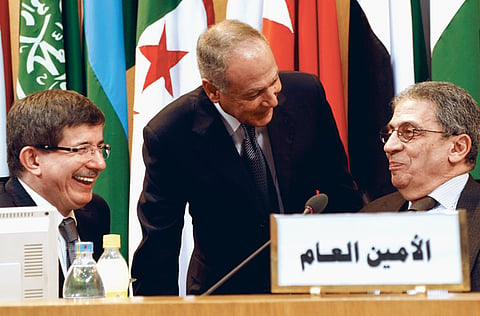Just another meeting
The Serte summit in Libya is not expected to achieve much for the Arab world

Contrary to last year's Arab summit, which was subject to much speculation and analysis given that it came shortly after the war on Gaza, the conclave this year in Libya was originally expected to be a low-key event.
That was the case until pandemonium broke loose in occupied Jerusalem weeks ahead of the summit, signalling that far from focusing on Iraq, Sudan or Lebanon, the Libya summit would deal primarily with the situation in Palestine.
Apart from discussing Israel's decision to build 1,600 new colonies in the West Bank, the spiralling violence in occupied Jerusalem and the siege of Gaza, the Arab summit on March 27 and 28 will also raise the issue of Palestinian prisoners in Israeli jails, according to Hamas chief Esmail Haniyah.
Fund for prisoners
The prime minister of the Hamas-led government in Gaza also proposed the establishment of a "Palestinian Prisoners Fund" to assist families of those languishing in Israeli jails, estimated to be about 7,300, and called on Arab states to contribute to its launch at the summit. Money from the fund, he added, would help lawyers file lawsuits in international courts against continued detention of Palestinian nationals, often with no arrest warrants, in Israeli jails.
According to sources in Tripoli, Libyan leader Muammar Gaddafi will call on the summit to halt any negotiations with Israel, in the light of the snowballing violence in occupied Jerusalem and the continued blockade of Gaza. Reportedly, Gaddafi will try to revive the famous "Three Nos" of the Khartoum Summit of September 1967 — no peace, no recognition and no negotiations with Israel.
Preparation for the summit was a difficult task in itself, given pending problems between the Arab League and Libya, which owes the League approximately $20 million, having refused to contribute to its annual budget for the past four years.
Inter-Arab rivalries still stand, mainly between Syria and Egypt, although two weeks ahead of the summit, an Egyptian minister's visit to Syria helped soothe relations between Damascus and Cairo. Syria, however, supported by Lebanon and Qatar, remains part of an Arab camp that is strongly in favour of Hamas and Hezbollah, making an absolute resolution on either portfolios rather difficult, given Egypt's strong stance on both issues.
In trying to encourage a high leader turnout, however, Gaddafi refrained from inviting two controversial guests who have attended earlier Arab summits, Iranian President Mahmoud Ahmadinejad and Khalid Mesha'al, head of the political bureau of Hamas.
Non-Arab representatives who will attend the summit include an envoy from China, UN Secretary General Ban Ki-moon, the president of the European Commission, the chairman of the African Union and King Juan Carlos of Spain, whose country heads the rotating European Union presidency.
Two notable Arab leaders who will not attend the summit are Egyptian President Hosni Mubarak, who recently underwent surgery in Germany, and Lebanese President Michel Sulaiman, whose country is furious that the Libyan invitation came through its embassy in Damascus and not through proper presidential channels in Beirut.
In reality, Sulaiman is under heavy pressure from powerful Shiite politicians in Lebanon, such as Hezbollah leader Sayyed Hassan Nasrallah and speaker of parliament Nabih Berri, who both accuse Libya of kidnapping leading Shiite cleric Mousa Al Sadr while on a visit to Libya in August 1978.
Al Sadr, who was 49 at the time of his disappearance, would be 81 today, and Lebanese Shiites believe he is still in the custody of Gaddafi. The president of Djibouti, Ismail Omar Guelleh, might also not show up unless Libya passes a resolution condemning Eritrean policies against Somalia, which to date, Gaddafi has refused to do.
Significant presence
Notable attendees include Syrian President Bashar Al Assad, Shaikh Hamad Bin Khalifa Al Thani of Qatar, Palestinian President Mahmoud Abbas, Iraqi President Jalal Talabani, Jordanian King Abdullah II, Saudi Arabian King Abdullah Ibn Abdul Aziz and the controversial president of Sudan, Omar Hassan Al Bashir, who faces an international warrant for his arrest for alleged crimes committed in Darfur.
Finally, the track record of Arab summits and the relative calm in non-Palestinian affairs explains why nobody is expecting major breakthroughs in Serte. Even if the summit comes out with strong resolutions in favour of the Palestinians, it will fail in halting the new colonies from being built and will also provide little succour to the miserable residents of Gaza, who will continue living under siege long after the Libya summit is over.
Low leader turnout in the last two conclaves at Damascus and Doha have also put a damper on Arab League summits, testimony to how deep divisions are within the "Arab family".
At the Damascus summit of 2008, for example, only 11 leaders showed up (minus Jordan, Saudi Arabia, and Egypt), while only ten came to the Beirut summit of 2002 (notably minus Yasser Arafat) and an equal number showed up at the one in Sharm El Sheikh in 2003. The highest turnout was at the Saudi Arabia summit in 2007, where a total of 17 leaders came to Riyadh — a feat that Gaddafi wishes to repeat — or top — this year in Serte.
By choosing his birthplace, rather than the Libyan capital Tripoli, as a venue for the summit, Gaddafi hopes to immortalise the city for having hosted the 22nd Arab Summit on the 41st anniversary of the Libyan Revolution.
Despite Gaddafi's personal and national agenda, which comes shortly after he called for jihad and an economic boycott of Switzerland for its ban on building new minarets, the Serte summit will bring nothing new to the Arab world.
Sami Moubayed is editor-in-chief of Forward Magazine in Syria.
Sign up for the Daily Briefing
Get the latest news and updates straight to your inbox


